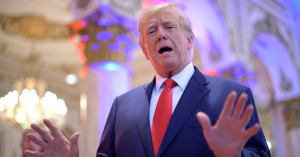President Donald Trump has reportedly told his allies he has no intention of conceding the 2020 presidential election, even after The Associated Press and other news outlets projected Joe Biden to be the winner. According to a CNN report, this has no legal repercussions, as the typical concession of one candidate to another is just a courtesy and not a legal act at all. However, it is yet another departure from tradition in his controversial presidency.
CNN reporter Kaitlan Collins first reported that Trump was telling his inner circle he will not concede to Biden, and plans a prolonged legal battle over these election results. Typically, political candidates make a formal concession at the end of an election, usually including a speech thanking their supporters and calling for renewed unity now that the electorate has decided. This case is likely to be different, though it might have been different either way.
Videos by PopCulture.com
In 2016, Hillary Clinton reportedly called Trump to concede when it became clear that he would win the presidency through the electoral college. However, in August, Clinton advised Biden not to make a concession call if he lost a slim margin. During an interview on Showtime’s The Circus, she said: “Joe Biden should not concede under any circumstances because I think this is going to drag out, and eventually I do believe he will win if we don’t give an inch and if we are as focused and relentless as the other side is.”
However, it looks like the race will not be particularly close when all the votes are counted as things stand now. At the time of this writing, Biden is projected to have 279 electoral college votes, while Trump is projected to have 213, according to CBS News. Moreover, Biden has about 50.5 percent of the country’s popular vote, while Trump has just 47.7 percent.
While Trump may not concede traditionally, critics are more concerned about his ongoing conspiracy theories about the election itself’s security. Trump continues to share dangerous rhetoric with no factual basis, claiming widespread voter fraud, illegal ballots, and other election tampering forms. There is no reason to believe any of this is true.
While Trump may keep these talking points alive in the weeks and months to come, Biden has already signaled his hope for unity. In his first public statement after his victory was projected, he said: “In the face of unprecedented obstacles, a record number of Americans voted. Proving once again that democracy beats deep in the heart of America. With the campaign over, it’s time to put the anger and the harsh rhetoric behind us and come together as a nation. It’s time for America to united. And to heal. We are the United States of America. And there’s nothing we can’t do, if we do it together.”



